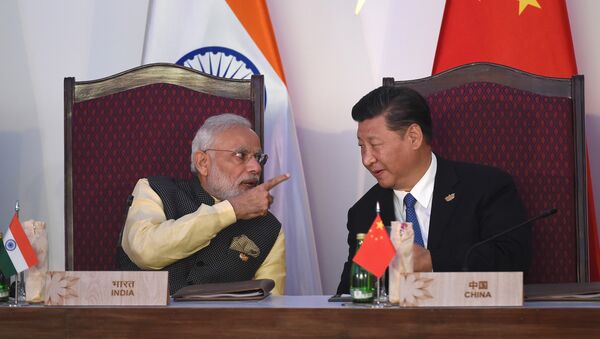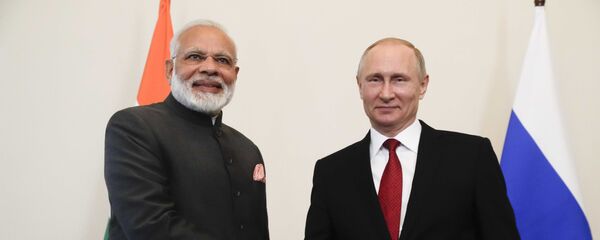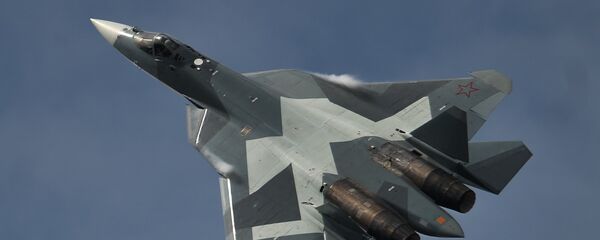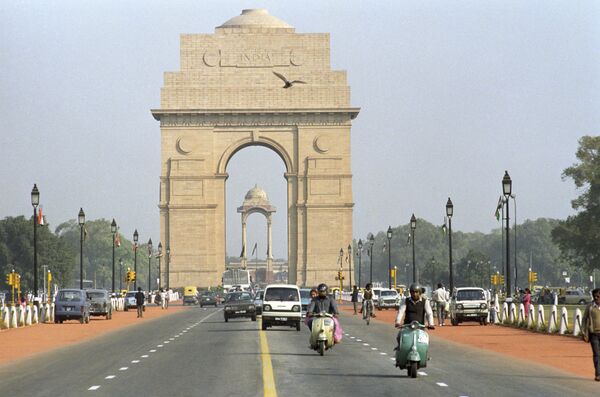India is going to come out on top in 2019-2020 in terms of economic growth amid the global slowdown, according to the International Monetary Fund's 2019 World Economic Outlook.
"India's economy is poised to pick up in 2019, benefiting from lower oil prices and a slower pace of monetary tightening than previously expected, as inflation pressure eases", the report says, forecasting that the country will grow at 7.5 percent in 2019 and 7.7 percent in 2020, thus outstripping the People's Republic of China.
Sputnik reached out to Amrita Dhillon, a foreign affairs analyst and founding editor of New Delhi-based Kootneeti magazine, asking her to comment on the IMF forecasts published on the eve of the World Economic Forum in Davos, Switzerland.
"This indeed a good sign for the Indian economy", Dhillon told Sputnik. "However, this race with China will bring some good hope for the region's development in the form of infrastructure development and creating jobs".
"[The] Chinese export-led growth model indeed made a way to their manufacturers and paved way to lift millions from poverty", the analyst highlighted. "However, India's market is not completely based on manufacturing, but investment and consumers which provide a steadier growth by introducing capitalist, digital and a market-based approach".
"India will become bigger than China eventually", Rajan opined. "So, India will be in a better position to create the infrastructure in the region which China is promising today. But this competition is good for the region and it will benefit for sure".
Commenting on India's sustainable growth, Dhillon pointed out that "a good credit goes to the economic reforms by Prime Minister Narendra Modi".
"However, credit equally goes to the digitalization race of the economies throughout the globe, public infrastructure development and private investment motivated by improvements in the business environment. This is indeed a wave which is creating millions of opportunities", she underscored.
India 'Ditching' the Greenback
According to the IMF 2019 report, India's rupee is confidently recovering from valuation lows in August-September 2018.
Earlier, reports emerged in 2018 that India was "ditching" the dollar amid the US sanctions and tariff spree against Russia, Iran, Turkey, and Venezuela.
"India is the third largest economy in terms of purchasing power", Dhillon noted. "As I pointed earlier, the Indian economy is investment and consumer-based. Indian imports are getting higher every day. India believes that sanctions on Indian trading partners indeed impact Indian trade".
In November 2018, India and Iran inked a bilateral agreement to settle crude trade through UCO Bank, a major government-owned commercial bank of India. It was further agreed that the transactions would be conducted in rupees. On 31 December 2018, New Delhi exempted rupee payments for the Iranian oil from heavy taxes.
At the same time, in December 2018, India's Ministry of Finance notified the rate of exchange for the Turkish lira and Korean won to bolster trade and business with Ankara and Seoul.
"The recent purchase of S-400 and Iranian oil was a bold step by the Indian government to not involve any third currency. This will make global trade more independent and effective, especially to the nations which have been hit hard by the sanctions", the Indian analyst emphasised.
RBI Selling US Bonds, Buying Gold
But that is not all: between April and October 2018, the Reserve Bank of India (RBI) sold US treasury bonds worth $16.3 billion, while in September it was reported that the bank had bought 8.46 tonnes of gold during the last fiscal year (April 2017 to March 2018) for the first time in nine years.
"This is another transformative move by RBI, we can see this as diversification of reserves assets for their deployment, keeping in mind the evolving global risks, especially, rising policy rates in the US", the Indian journalist said, commenting on the issue. "Not only [has] India purchased gold, but also the RBI has sold foreign currencies worth $18.6 billion in the spot market since 2018 April to rein the value of the rupee, which is going down".
According to Dhillon, "such measures by the RBI are making the Indian economy more independent, which will help to shape Indian economic policies around the globe; on the other hand, it also contributes to the global economy by countering [the] financial hegemony of the US".
Modi and 2019 Indian General Vote
Regardless of India's obvious economic gains, Time Magazine envisages that the Modi government may face certain difficulties in the upcoming 2019 general elections. The magazine emphasised the fact that the December polls in India indicated that the governing Bharatiya Janata Party (BJP) wouldn't win a single state.
"India has often been perceived as primarily a rural democracy, with 69 percent of its population inhabiting rural areas where the population believes in the immediate outcomes instead of reports by international organizations", Dhillon pointed out.
She stressed that PM Modi's policies "are indeed transforming, but in a country like India the process of transformation is a bit rigid and long".
"Internally the issues like unemployment and high rates of suicide among farmers bring a concern to all the levels and [are] somehow seen as a decisive factor in BJP's defeat. So boasting on reports is not going to help BJP win another term. However, the government is proactively working on the concerned issues and the next 5 months of dedication could incline more voters in favour", the analyst concluded.
The views and opinions expressed by the contributors do not necessarily reflect those of Sputnik.








